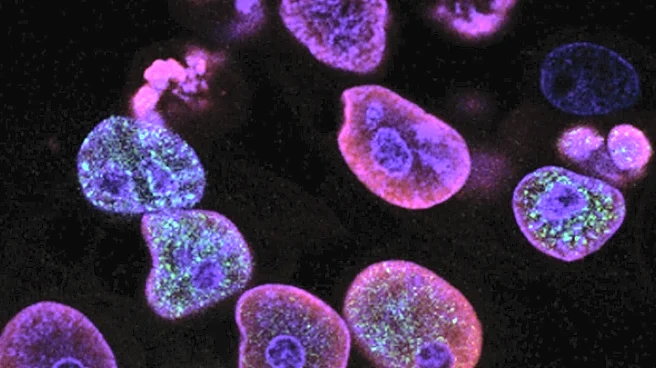What is the story about?
What's Happening?
A recent study has uncovered critical insights into the immune response following acute myocardial infarction (MI). The research highlights the infiltration of immune cells, specifically CCR2+ Mo/MΦ, through the endocardium as early as four hours post-MI. This infiltration is facilitated by local upregulation of adhesion factors such as vWF, marking the endocardium as a significant route for immune cell entry into the infarcted area. The study utilized spatial multiomics to analyze the cellular landscape of acute MI, revealing previously unknown pathways of immune cell infiltration and suggesting potential targets for pharmacological intervention.
Why It's Important?
The findings of this study are significant for the medical community as they provide a deeper understanding of the immune response mechanisms in myocardial infarction. By identifying the endocardium as a key route for immune cell infiltration, the research opens up new avenues for targeted therapies that could potentially improve recovery and outcomes for patients suffering from heart attacks. This could lead to advancements in treatment protocols and the development of drugs aimed at modulating immune cell activity in the heart, thereby reducing damage and improving cardiac function post-MI.
What's Next?
Future research may focus on developing pharmacological interventions that target the adhesion factors facilitating immune cell infiltration through the endocardium. Additionally, clinical trials could be initiated to test the efficacy of such treatments in improving patient outcomes after myocardial infarction. The study also sets the stage for further exploration into the cellular dynamics of heart disease, potentially leading to breakthroughs in personalized medicine for cardiac patients.
Beyond the Headlines
The study's implications extend beyond immediate treatment strategies, as it may influence long-term approaches to managing heart disease. Understanding the role of immune cells in cardiac repair and remodeling could lead to innovative therapies that not only address acute symptoms but also contribute to the prevention of chronic heart conditions. This research underscores the importance of interdisciplinary approaches combining molecular biology, cardiology, and pharmacology to tackle complex health issues.
















